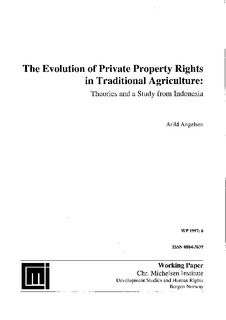The Evolution of Private Property Rights in Traditional Agriculture: Theories and a Study from Indonesia
Working paper
Permanent lenke
http://hdl.handle.net/11250/2435880Utgivelsesdato
1997Metadata
Vis full innførselSamlinger
- Bora-import [434]
Sammendrag
The starting point of this paper is a universally observed tendency of common property to be replaced by private property in traditional agriculture. The paper seeks to explore the forces behind such a development. Four different theoretical approaches are discussed: neo-institutional economics, which focuses on increasing land value; Marxian, class-based explanations; a state-local perspective, focusing on predatory state intervention and lack of respect for customary law; and a cultural explanation based on a "commoditization of land" hypothesis. These approaches are discussed in relation to the development in the study area in Sumatra. A framework which integrates elements of all approaches is outlined, using a "demand and supply for institutional change" metaphor. In particular, the neo-institutional and the state-local approaches are found to be relevant to explain the evolution of private property rights. The paper also develops a formal analytical model which endogenizes farmers' decisions about tenure security.
Utgiver
Chr. Michelsen InstituteSerie
CMI Working paperWP 1997: 6
